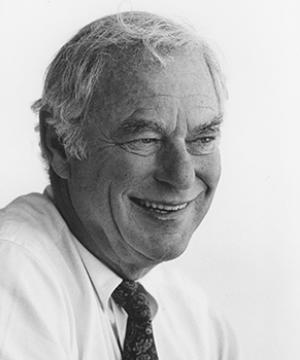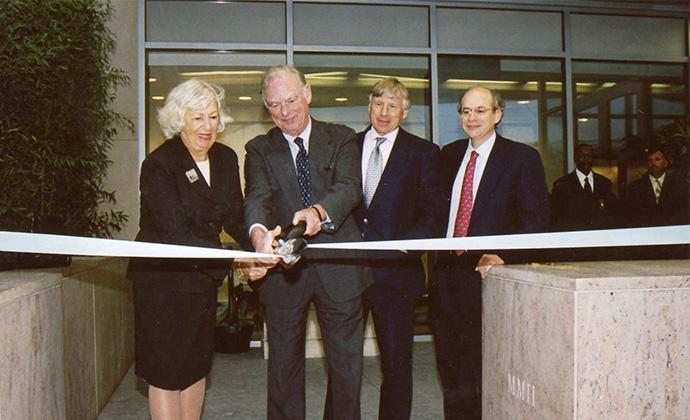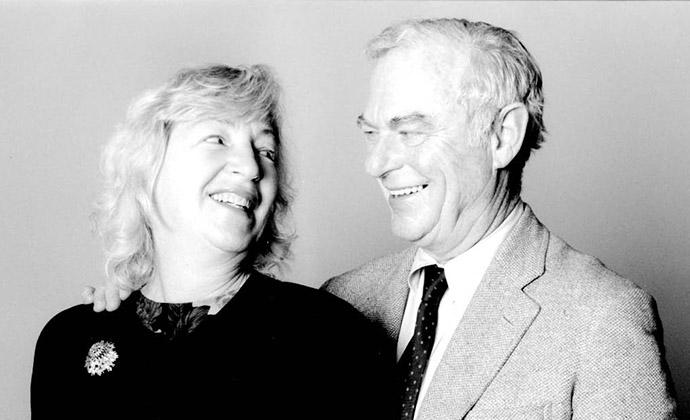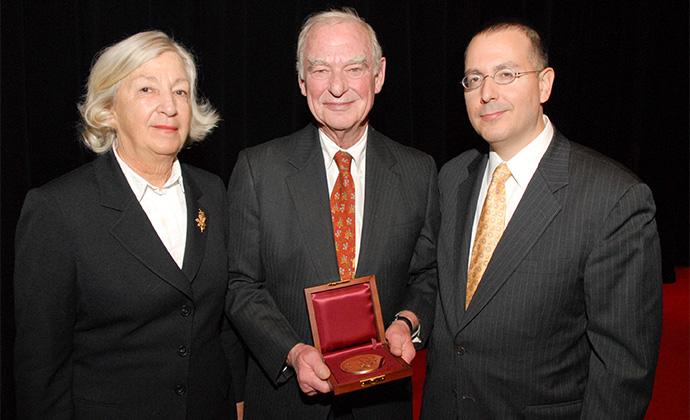Remembering Gerry Lenfest ’58
August 5, 2018—H.F. “Gerry” Lenfest ’58, a cable TV pioneer, entrepreneur, and prominent philanthropist whose generosity and loyalty left an enduring imprint on Columbia Law School and Columbia University, died on August 5 in Philadelphia. He was 88.
Lenfest rose from modest beginnings to become the owner of his eponymous multibillion-dollar cable company. Following its sale to Comcast, he and his wife, Marguerite, proceeded to join the ranks of the country’s most generous philanthropists by donating more than $1 billion to a broad range of organizations supporting the arts and education, as well as a range of humanitarian and environmental causes and institutions.
The scale and breadth of his generosity to Columbia were remarkable. Over many years, he and Marguerite provided funding to build and renovate the Law School’s physical plant and support the continuing excellence of its faculty and students.
“Even more than his professional success, Gerry will be remembered as a transformative philanthropist,” said Gillian Lester, Dean and Lucy G. Moses Professor of Law, adding, “Gerry was a deeply good person: wise, genuine, and a thoughtful advisor. His loss will be felt throughout our community.”
One of his most notable and visible gifts to the Law School was to build Lenfest Hall—the 17-story apartment building overlooking Morningside Park that houses more than 200 Columbia Law School students. A much-needed residence hall at the time it was built in 2003, it enables graduate students from all over the world to study and live in New York City with their young families.
More recently, in 2011, Lenfest pledged $30 million to support the construction of a dynamic hub for cultural and civic exchange on Columbia University’s new Manhattanville campus. Designed by architect Renzo Piano, the 60,000-square-foot state-of-the-art facility opened in 2017 as the Lenfest Center for the Arts. It now serves as a major venue for engagement in the rich cultural life of Columbia, Harlem, and New York City at large.
Lenfest’s philanthropy extended well beyond the Columbia campus. He helped create the Museum of the American Revolution, donating more than $60 million and negotiating a property trade to ensure the institution had a home in historic Philadelphia. In 2016, he gave $20 million to create the Lenfest Institute for Journalism, a visionary nonprofit dedicated to developing and supporting sustainable business models for local media. That gift included transferring ownership of storied journalistic institutions—the Philadelphia Inquirer, Philadelphia Daily News, and Philly.com—to the Institute. And the Lenfest Scholars program, which Lenfest and his wife created in 2001, offers university scholarships to rural high school students in central and southeastern Pennsylvania.
In recognition of their outstanding and innovative leadership in philanthropy, the couple was awarded the Carnegie Medal of Philanthropy in 2017. The award is given to philanthropists who reflect the values of Andrew Carnegie, who believed in the “business of benevolence.”
Lenfest came from relatively modest circumstances. He and his twin sister, Marie, were born in Jacksonville, Florida, in 1930, and moved with their family to Scarsdale, N.Y., the following year. When Lenfest was 13, the family moved to a farm in rural New Jersey, which had no plumbing or electricity.
“I didn’t grow up with a silver spoon. My father sold diesel engines for ships,” Lenfest recalled in an interview for the Horatio Alger Association. “I lived on the farm pretty much alone because my father traveled a lot, and I pretty much ran the farm.”
His mother died of a cerebral hemorrhage shortly after the family’s move to the farm, a tragedy that upended his life. Lenfest attended a series of high schools before finally graduating from the Mercersburg Academy in Pennsylvania. Not certain about what he wanted to study in college, Lenfest worked odd jobs, including as a farmhand in Iowa, a seaman on an oil ship, and a laborer in the North Dakota oil fields.
Lenfest eventually enrolled in Washington and Lee University in Lexington, Virginia. He graduated in 1953 with a degree in economics, then served on a destroyer in the U.S. Navy. Following his discharge from active duty in 1955, he married Marguerite Brooks, and the two settled in a Greenwich Village apartment while Lenfest pursued his studies at Columbia Law School. Marguerite supported the couple as an elementary school teacher until Lenfest earned his law degree.
Upon graduation, Lenfest joined the law firm Davis Polk & Wardwell. One of the firm’s clients was Walter Annenberg, the owner of the media holding company Triangle Publications, which controlled radio and television stations, as well as several print publications. Annenberg offered Lenfest a staff attorney position at Triangle, and Lenfest quickly rose to oversee the company’s cable television operations.
The pivotal moment in Lenfest’s career came in 1973 when Annenberg decided to sell two cable systems. Lacking capital of his own, Lenfest convinced two Pennsylvania investors to buy the entities. In exchange, Lenfest promised a 100 percent return on their investment within five years. The companies, Suburban Cable and Lebanon Valley Cable, became the bedrock of Lenfest’s privately-held media holding company, Lenfest Communications. Marguerite took a night class in bookkeeping at a local high school in order to manage the books—a job she held for 25 years.
During the next two decades, Lenfest Communications grew its subscriber base from 7,600 to more than 1.2 million customers. In 2000, the company was acquired by Comcast for approximately $7 billion.
The Lenfests’ share of the sale totaled $1.2 billion, and the couple gave away more than $1 billion to various entities. “[W]e really don’t want to die with much money to our name,” Lenfest told Philanthropy magazine in 2011. “Andrew Carnegie said, ‘The man who dies thus rich dies disgraced.’ That makes an awful lot of sense to me.”
A member of Columbia Law School’s Board of Visitors and Dean’s Council for many years, Lenfest was honored with the Medal for Excellence, the Law School’s most prestigious award for alumni, in 2008.
In accepting the award, Lenfest fondly recalled learning from the Law School’s exceptional faculty, including Adolf A. Berle, an economic theorist who helped craft banking laws of the New Deal, and Walter Gellhorn ’31, a civil rights pioneer and influential thinker in the field of administrative law. “It was a very proud moment for me to be accepted to Columbia,” he said.
Ever indefatigable, Lenfest served as honorary co-chair of The Campaign for Columbia Law and his 60th class reunion in June. As a special gift to his classmates, Lenfest arranged to have the Zorá String Quartet of the Curtis Institute of Music perform.
Lenfest also was s a trustee emeritus of Columbia University and served as the chair of the Philadelphia Museum of Art and the Curtis Institute of Music.
In addition to his wife, he is survived by his daughter, Diane Lenfest Myer, and his sons, H. Chase Lenfest and Brook J. Lenfest.
Information about memorial arrangements will be posted on this page soon.
###
Posted on August 6, 2018




